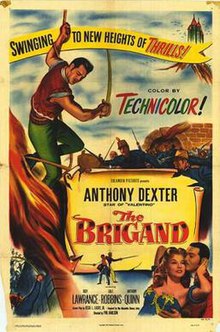
Summary
The Brigand is a 1952 American adventure romance film directed by Phil Karlson and starring Anthony Dexter, Jody Lawrance and Anthony Quinn. It is the second film that Anthony Dexter made for producer Edward Small for Columbia Pictures after his debut in Valentino.
| The Brigand | |
|---|---|
 Original film poster | |
| Directed by | Phil Karlson |
| Written by | Jesse L. Lasky, Jr. |
| Based on | treatment by George Bruce novel by Alexandre Dumas |
| Produced by | Edward Small (uncredited) |
| Starring | Anthony Dexter Jody Lawrance Anthony Quinn |
| Cinematography | W. Howard Greene |
| Edited by | Jerome Thoms |
| Music by | Mario Castelnuovo-Tedesco |
| Color process | Technicolor |
Production company | |
| Distributed by | Columbia Pictures |
Release dates |
|
Running time | 94 minutes |
| Country | United States |
| Language | English |
Plot edit
A rogue exile impersonates a King and a virtuous person wants to be so because he is the rightful heir to the throne.
Loosely based on The Brigand by Alexandre Dumas, the film is set in the Napoleonic era in 1804 in the mythical Iberian nation of "Mandorra". The film bears a resemblance to The Prisoner of Zenda with Dexter playing a dual role of a rogue exile who impersonates a King in danger of being overthrown by his cousin played by Anthony Quinn.
The scheming Quinn plans a "premeditated accident" to King Lorenzo by giving him a hunting weapon that is rigged to fire backwards; an idea reused by director Phil Karlson in his The Silencers. With the real King unable to perform his duties, the swashbuckling distant relative Carlos DeLago, late of the Sultan of Morocco's Guard steps in to save the Kingdom.
Cast edit
- Anthony Dexter as Captain Carlos Delargo/King Lorenzo of Mandorra
- Jody Lawrance as Princess Teresa
- Gale Robbins as Countess Flora
- Anthony Quinn as Prince Ramon
- Carl Benton Reid as Prime Minister Triano
- Ian MacDonald as Maj. Schrock
- Lester Matthews as Dr. Lopez
- Walter Kingsford as Sultan of Morocco
- Holmes Herbert as Archbishop
- George Melford as Majordomo (uncredited)
Production edit
There is no producer credit on the film but the movie was produced by Edward Small just before he left Columbia to return to United Artists.[1]
In May 1949 it was reported that Small had hired Robert Libott and Frank Burt to write the script in 1949.[2] In December 1949 Small signed a two-year contract with Columbia to make "two to six" films, which would include Lorna Doone and The Brigand, "projects he had been developing for some time." This contract was separate to one Small had signed with Columbia to distribute Valentino.[3]
In August 1950 Small announced that he would make two films starring Anthony Dexter, who had made Valentino for the producer. The films would be The Brigand and a remake of The Sheik.[4] In May 1951 Jesse Lasky Jr was reportedly writing the script.[5] The same month Phil Karlson was announced as director.[6]
Ron Randell had appeared in Lorna Doone for Small.[7] In August 1951 he signed to appear in The Brigand; he was to do it at the same time as appearing in Broadway Bill at the Pasadena Playhouse.[8]
Filming started 9 July 1951.[9]
Reception edit
The New York Times called it "no great shakes. But neither, as a standard sample of this type of entertainment, is it hard to take."[10] Variety called it "a program swashbuckler".[11] The Los Angeles Times said "serious characterisation gives way to dash and colour."[12]
References edit
- ^ Schallert, Edwin (Dec 22, 1949). "'Telegraph Hill' Aimed at Andrews and Prelle; Kazan Runs 'Streetcar'". Los Angeles Times. p. 15.
- ^ "MOVIELAND BRIEFS". Los Angeles Times. May 3, 1949. p. A7.
- ^ "METRO WILL FILM STORY OF ISRAEL". New York Times. Dec 21, 1949. p. 41.
- ^ Schallert, Edwin (Aug 22, 1950). "Mitchell Likely Cap'n Andy; Preston to Star as Heavy With Rooney". Los Angeles Times. p. A11.
- ^ "STUDIO BRIEFS". Los Angeles Times. May 16, 1951. p. B8.
- ^ "JAPANESE ACTRESS GETS ROLE IN MOVIE". New York Times. May 22, 1951. p. 37.
- ^ Vagg, Stephen (August 10, 2019). "Unsung Aussie Actors – Ron Randell: A Top Twenty". Filmink.
- ^ Schallert, Edwin (Aug 6, 1951). "Drama: Eddie Bracken to Act Top Role in 'About Face;' Keith Slate Amplified". Los Angeles Times. p. B9.
- ^ Schallert, Edwin (May 22, 1951). "Drama: 'Ice Cream League' Will Aid Cause of Juveniles; Mary Anderson Stars". Los Angeles Times. p. B7.
- ^ H. H. T. (26 July 1952). "The Brigand' Plays Dual Role at Palace". New York Times. p. 9.
- ^ "Review of film". Variety.
- ^ Scott, John L. (31 July 1952). "SWASHBUCKLERS TAKE OVER ON TWO SCREENS". Los Angeles Times. p. A7.
External links edit
- The Brigand at IMDb
- The Brigand at the TCM Movie Database


